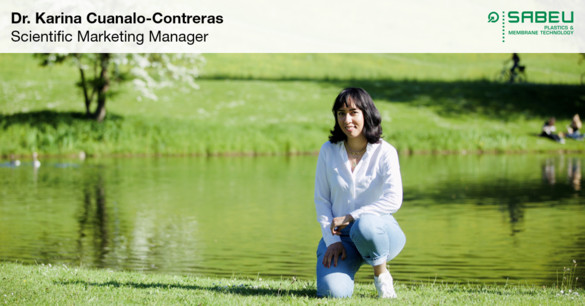We are thrilled to welcome Dr. Karina Cuanalo-Contreras to the SABEU and cellQART team as our Scientific Marketing Manager.
Read more about Karina and the childhood question that triggered her scientific studies, her research on flavonoids and aging, patents for antivirals against the swine flu pandemic, and her motivation to move from in vivo to in vitro models.
Karina’s biography:
I was born and raised in Puebla, a small city in Mexico. There is where my fascination for nature started. When I was a child I spent countless hours looking at animals, insects and plants. Very soon I became aware that they all age and I wanted to understand why. I decided then to study Biology. My research focused on Flavonoids, which are molecules with the capability to delay aging.
By the time I got my bachelor’s degree, the world got hit by the swine flu pandemic and I had the opportunity to start my master’s thesis in a research project to find antivirals against the new Influenza variant. With this goal in mind, I performed high throughput virtual screening. As a result, we were granted with two patents and I had the chance to conduct part of my research at the Leibniz-Zentrum für Medizin und Biowissenschaften in Germany. Although this experience opened up new horizons, I felt something was missing…
...and once again life gave me a new exciting opportunity to learn and to start a PhD! This time, I moved to the USA to join the amazing group of Dr. Claudio Soto at The University of Texas. There I had the chance to explore aging using in vitro and in vivo models. First I worked with C. elegans, a tiny cute worm who helped me understand the mystery of aging. Slowly I moved to mouse models to study neurodegeneration and Alzheimer’s disease. Whereas in vivo models are useful, I found that they don’t recapitulate all aspects of disease in humans and they bring many experimental and ethical concerns.
Therefore, I decided to transition to cell culture assays, as they provide invaluable insights into biological and pathological mechanisms, while contributing to minimize invasive procedures performed in animals. For that, I learned every single step involved in cell cultivation and I was invited to participate in a project to generate 3D brain organoids to study brain aging…how cool! Whereas aging is not yet completely understood, I feel happy to have made my tiny contribution to the field.
As a result of my research experience, I am convinced that cell culture methods are the best tool to study biology and disease. However, I realized that there is an urgent need to develop higher quality cell culture products and new technologies and this can only be achieved by including the industry. After 8 years in the USA, life gave me the opportunity to move to Germany and to meet SABEU’s amazing multidisciplinary and friendly team. It was an instant match!
SABEU is going the extra mile to develop the highest quality cell culture products, with the final goal to help researchers achieve the extraordinary. SABEU’s team is giving me the possibility to learn and to contribute with my expertise to make a positive impact on society and science. I am certain that our work will help scientists accomplishing astonishing discovers, and why not…to figure out why we age…
6 questions in short
- How many languages do you speak and which one is your favorite?
Spanish is my mother language. I learned English when I moved to the USA and since one year I have been learning German. I speak VERY basic Italian and French as well. I don’t have a favorite language as I find all of them interesting and unique: the expressions, the sounds, the words, etc. - Do you want to learn another language?
Of course! Once I master the German language (this may take some time though), I want to learn Japanese. I feel intrigued and attracted by the richness of Japanese culture. - What have you learned from living in different countries?
I have learned that people are good and nice, no matter where you go. I have also learned that one needs to be flexible and open to learn from other cultures. - What are your hobbies?
I do calligraphy and amateur street photography. I love hiking and I am currently learning in line skating. - Do you have any personal motto?
“If you are not willing to learn, no one can help you. If you are determined to learn, no one can stop you” - Any secret talent?
I am a walking karaoke machine. I know more lyrics that you can imagine ♪♫.
